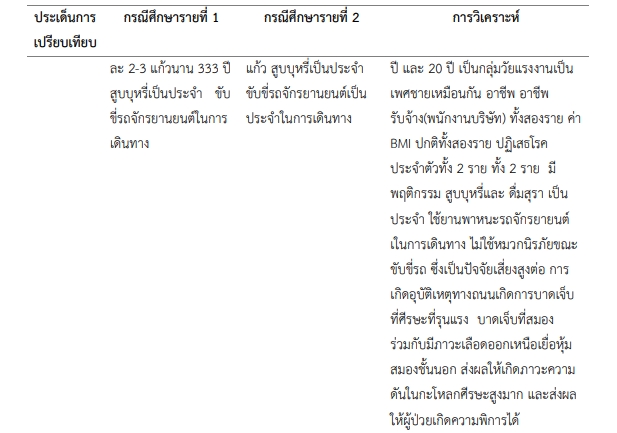การพยาบาลผู้ป่วยบาดเจ็บที่สมองร่วมกับมีภาวะเลือดออกเหนือเยื่อหุ้มสมองชั้นนอก : กรณีศึกษา 2 ราย
คำสำคัญ:
การบาดเจ็บที่สมอง, ภาวะเลือดออกเหนือเยื่อหุ้มสมองชั้นนอกบทคัดย่อ
การศึกษานี้เป็นการศึกษาเปรียบเทียบการพยาบาลผู้ป่วยบาดเจ็บที่ศีรษะร่วมกับมีภาวะเลือดออกเหนือเยื่อหุ้มสมองชั้นนอก จำนวน 2 ราย ณ ห้องตรวจอุบัติเหตุและฉุกเฉิน และหอผู้ป่วยศัลยกรรมอุบัติเหตุ โรงพยาบาลขอนแก่น ระยะเวลาตั้งแต่วันที่ 4 มีนาคม – 6 เมษายน 2566 พบว่าผู้ป่วยทั้งสองราย อายุอยู่ในช่วงวัยทำงาน 26 ปี และ 20 ปี ใช้ยานพาหนะรถจักรยายนต์ในการเดินทาง ไม่ใช้หมวกนิรภัยขณะขับขี่ ผู้ป่วยทั้ง 2 รายได้รับอุบัติเหตุทางถนนจากรถจักรยานยนต์ ถูกนำส่งจากจุดเกิดเหตุไปโรงพยาบาลชุมชนระดับ M2 รพ.ขอนแก่น ด้วยรถกู้ชีพทั้ง 2 ราย และผู้ป่วยรายที่ 2 ส่งต่อมายังโรงพยาบาลขอนแก่นผ่านระบบ ER Call Center ระยะเวลาการเข้าถึงโรงพยาบาลขอนแก่นและการรับบริการแตกต่างกัน ผู้ป่วยรายที่ 1 Onset to ER 30 นาที Onset to CT 40 นาที CT brain Epidural hemorrhage at right temporal ได้รับการรักษาแบบประคับประคอง ไม่มีภาวะแทรกซ้อนระหว่างนอนรักษาในโรงพยาบาล ระยะเวลาวันนอนรวม 5 วัน ผู้ป่วยรายที่ 2 CT brain พบ Epidural hemorrhage at Left frontotemporal ได้รับการรักษาโดยการผ่าตัด Left craniectomy to remove clot มีภาวะแทรกซ้อนปอดติดเชื้อ ระยะเวลาวันนอนรวม 12 วัน ส่งต่อไปรักษาโรงพยาบาลใกล้บ้าน Onset to ER รพ.ชุมชน 30 นาที Onset to CT 2 ชั่วโมง Onset to OR 5 ชั่วโมง 24 นาที การประเมินผู้ป่วย ณ จุดเกิดเหตุ การสื่อสารความร่วมมือขณะนำส่งอย่างที่มีประสิทธิภาพ ทำให้ผู้บาดเจ็บเข้าถึงบริการจากจุดเกิดเหตุถึงห้องฉุกเฉิน ส่งต่อระหว่างโรงพยาบาล และได้รับการวินิจฉัยโดยการทำ CT scan brain อย่างรวดเร็ว ผ่าตัดอย่างรวดเร็ว ซึ่งผู้บาดเจ็บสมองการพยากรณ์โรคขึ้นกับเวลาที่เข้ารับการรักษา และการได้รับการรักษาอย่างทันท่วงทีจะทำให้ผู้ป่วยมีโอกาสรอดชีวิต และลดความพิการได้ ฉะนั้นการพยาบาลผู้ป่วยบาดเจ็บต่อสมอง พยาบาลต้องประเมินอาการเปลี่ยนแปลงอย่างรวดเร็ว ถูกต้อง และต่อเนื่อง และสามารถประเมินความเสี่ยง ภาวะแทรกซ้อนที่อาจเกิดขึ้นกับผู้ป่วยเพื่อเป็นข้อมูลในการวางแผนการพยาบาลทั้งในระยะที่จะเข้าสู่ระยะวิกฤตและระยะฟื้นฟู การปฏิบัติการพยาบาลตามแนวทางอย่างถูกต้องครบถ้วนจะสามารถลดภาวะแทรกซ้อน วันนอนโรงพยาบาล ลดความพิการ และการเสียชีวิตได้

ดาวน์โหลด
เผยแพร่แล้ว
รูปแบบการอ้างอิง
ฉบับ
ประเภทบทความ
สัญญาอนุญาต
ลิขสิทธิ์ (c) 2023 วารสารการส่งเสริมสุขภาพและอนามัยสิ่งแวดล้อมบทความในวารสารนี้มีลิขสิทธิ์โดยและเผยแพร่ภายใต้สัญญาอนุญาต Creative Commons แบบแสดงที่มา-ไม่ใช้เพื่อการค้า-ไม่ดัดแปลง 4.0 ระหว่างประเทศ (CC BY-NC-ND 4.0)
สามารถอ่านและนำไปใช้เพื่อวัตถุประสงค์ทางวิชาการ เช่น การสอน การวิจัย หรือการอ้างอิง โดยให้เครดิตแก่ผู้เขียนและวารสารอย่างเหมาะสม
ห้ามใช้หรือดัดแปลงบทความโดยไม่ได้รับอนุญาต
ข้อความที่ปรากฏในบทความเป็นความคิดเห็นของผู้เขียนแต่เพียงผู้เดียว
ผู้เขียนต้องรับผิดชอบต่อเนื้อหาและความถูกต้องของบทความของตนทั้งหมด
การนำไปใช้ซ้ำหรือเผยแพร่ซ้ำในรูปแบบอื่นต้องได้รับอนุญาตจากวารสาร


